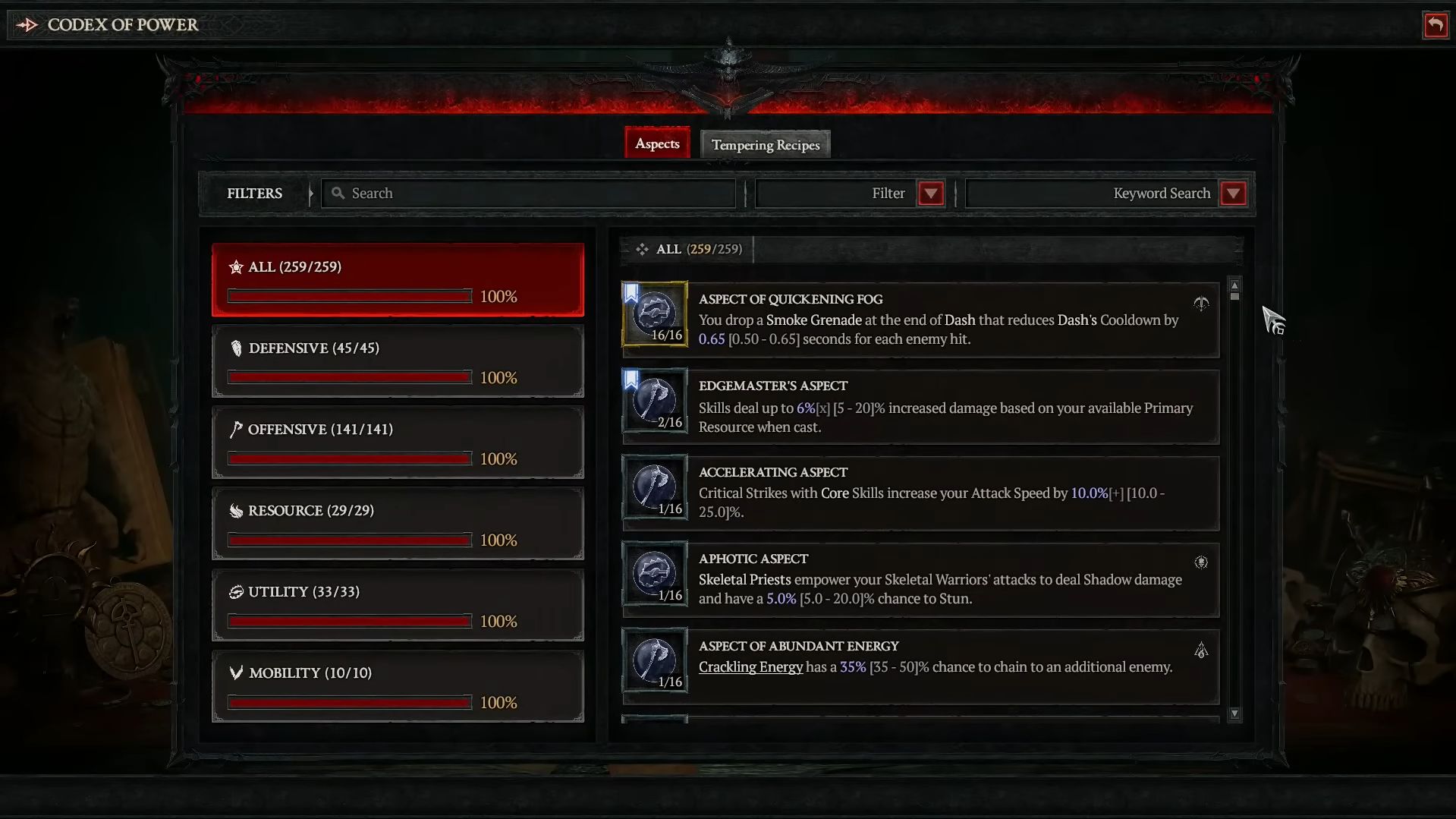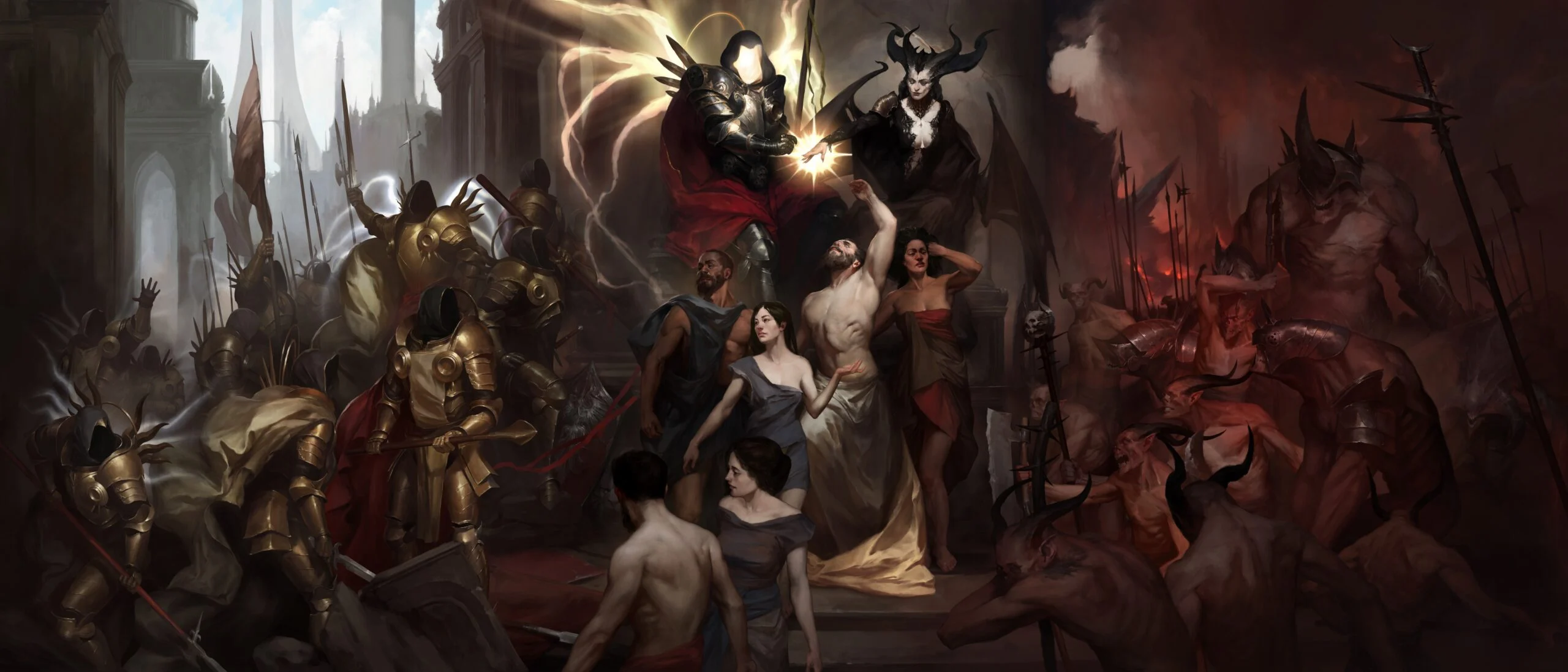Legendary Aspects are a core part of Diablo 4’s character-building process, and you will see them recommended in any build you find on the Internet. In this guide, we will go over exactly what Legendary Aspects are, how they can be obtained, and how they interact with the Codex of Power.
Most importantly, you will learn why you should care about them and how to best work the system to your advantage while minimizing waste.
What are Legendary Aspects?
Legendary Aspects (or Aspects, as we will refer to them throughout the rest of this guide) are special powers that exist on Legendary Items in Diablo 4. These are usually more peculiar effects that add new interactions between skills of the class to which they belong, make certain skills better or different, or just add new mechanics to your character.
There are 5 different categories of Aspects (Offensive, Defensive, Resource, Utility, and Mobility), and each category of Aspect can only be applied to a certain number of gear slots, as follows.
- Offensive: 1-Handed Weapon, 2-Handed Weapon, Gloves, Amulet, Ring
- Defensive: Shield, Helm, Chest, Pants, Amulet
- Resource: Ring, Amulet
- Utility: Shield, Helm, Chest, Amulet, Gloves, Boots, Pants
- Mobility: Amulet, Boots
On Amulets, the base effect of an Aspect is increased by 50%, and on a 2-Handed Weapon, its effect is increased by 100%.
While Aspects can exist naturally on Legendary Items that you find in the game (and these items can be upgrades for your character, and therefore very usable as such), their main function in character-building is to obtain them and then imprint them onto other legendary items of your choice (that is to say, with the stats you want for your build). We go into detail about this below.

Aspect Ranges and Rolls
Some Aspects, like the  Aspect of Perpetual Stomping, have a very straightforward effect that has no potential for variation, as we can see in its tooltip text. The Aspect will always be the same no matter what. That said, most Aspects have one or more elements that have a variable component. An example of this is
Aspect of Perpetual Stomping, have a very straightforward effect that has no potential for variation, as we can see in its tooltip text. The Aspect will always be the same no matter what. That said, most Aspects have one or more elements that have a variable component. An example of this is  Aspect of Might. This will have a random number (between 2.0 and 6.0 seconds) for the duration of Damage reduction granted by Basic skills.
Aspect of Might. This will have a random number (between 2.0 and 6.0 seconds) for the duration of Damage reduction granted by Basic skills.
We call these intervals ranges, and we call the precise number on a given Aspect a roll within that range.
How to Get Aspects
There are two sources for Aspects in Diablo 4. One is dungeons, and the other is Legendary Item drops in the world of the game.
Most of the Aspect that exists in the game can be obtained by completing one of the many dungeons. When you hover over a dungeon’s entrance on the map, it will tell you what the Aspect you get as a reward for completing that dungeon is. Once the dungeon is complete, the Aspect will automatically be added to your Codex of Power (see below for more on this topic). From here, it can be imprinted onto a Rare or Legendary item of your choice, giving that item the Aspect and, if it was a rare item before, turning it into a Legendary.
All of these Aspects also occur naturally on Legendary Items that drop from monsters, chests, caches, and so on. These Aspects can simply be used with the item on which they dropped, or they can be salvaged. Once salvaged, the Aspect and its roll is automatically saved in the Codex of Power. If you have a higher roll, it will increase the Aspect’s rank.
Our build guides will always provide you with the source of the recommended Aspect, be it a dungeon or exclusively a drop.
Legendary Aspects display an icon on their item inside the inventory, indicating that salvaging would upgrade the rank within the codex.

The Codex of Power
The Codex of Power is essentially an account-wide collection of all available Aspects. The Aspects you received from salvaging gear or from completing dungeons will all register in the Codex. Assuming you have the relevant area of the world map explored, clicking an Aspect that you do not have in your Codex of Power will highlight its dungeon on the map for you.
Salvaging Legendary items saves their power as Aspects inside your Codex of Power, which can be reused indefinitely. Inside the codex, you can filter aspects by class, unlockable from a dungeon, favorite aspects, or newly acquired.

Once an Aspect is registered in your Codex, every time you salvage an item with the same Aspect, its rank in the Codex will increase. Aspects can only be upgraded a total of 16 times. Depending on your roll, the Aspect rank can be upgraded multiple times at once.
If this is your first time salvaging an Aspect with a maxed-out roll, the Codex will save it as rank 16. It is important to know that maxed-out rolls only drop in World Tier 4. Additionally, a maxed-out Aspect will have a distinct golden border within the codex, indicating that the aspect has reached rank 16/16. This way, it is easy to see at a glance, and you do not have to read the rank numbers to identify which of your Aspects are maxed out.

Imprinting Aspects
Imprinting Aspects onto Rare or Legendary items can be done under the “Imprint Aspect” tab at the Occultist. This requires you to place the item you wish to imprint, and then choose the Aspect you want from the Codex of Power. Make sure that the Aspect you want can actually be imprinted onto the item slot you chose (Armor, Weapon, Gloves, etc.).
In addition to the gold cost, Imprinting also requires crafting materials. The material costs depend on the item and the rank of the Aspect you wish to imprint.

Recommended Aspect Management Strategy
While the purpose of this guide is mainly to explain the system and how it works, we can also offer some suggestions as to how you should go about managing your Aspects while leveling a new character, and while progressing in the endgame.
- Open your build page and take note of the Aspects that can benefit you.
- For leveling builds, Aspects are never mandatory, but you should still aim to get them because they can offer nice boosts of power to help you along.
- Make a relatively high-priority list of needed Aspects and focus on completing their respective dungeons in the world. This will allow you to imprint them onto items and help you along your leveling journey.
- Salvage any Legendary you do not need anymore in order to record or upgrade the Aspect in your Codex. The tooltip of the item lets you know which item to salvage to update your Codex.
- Imprint the most important Aspect onto Rings or Amulets while leveling, since you will switch those out less often than Weapons, allowing you to save on gold and materials.
- If an Aspect is already at max rank in your Codex, sell the Legendaries to the Blacksmith to win more gold.
Remember, the Codex of Power is one of your best allies, as Legendary Aspects are the essence of character customization and power progression. Whether you’re aiming for pushing Nightmare Dungeons, farming bosses, or Helltide, choosing the proper Aspects for your build will help you maximize your character’s potential.






